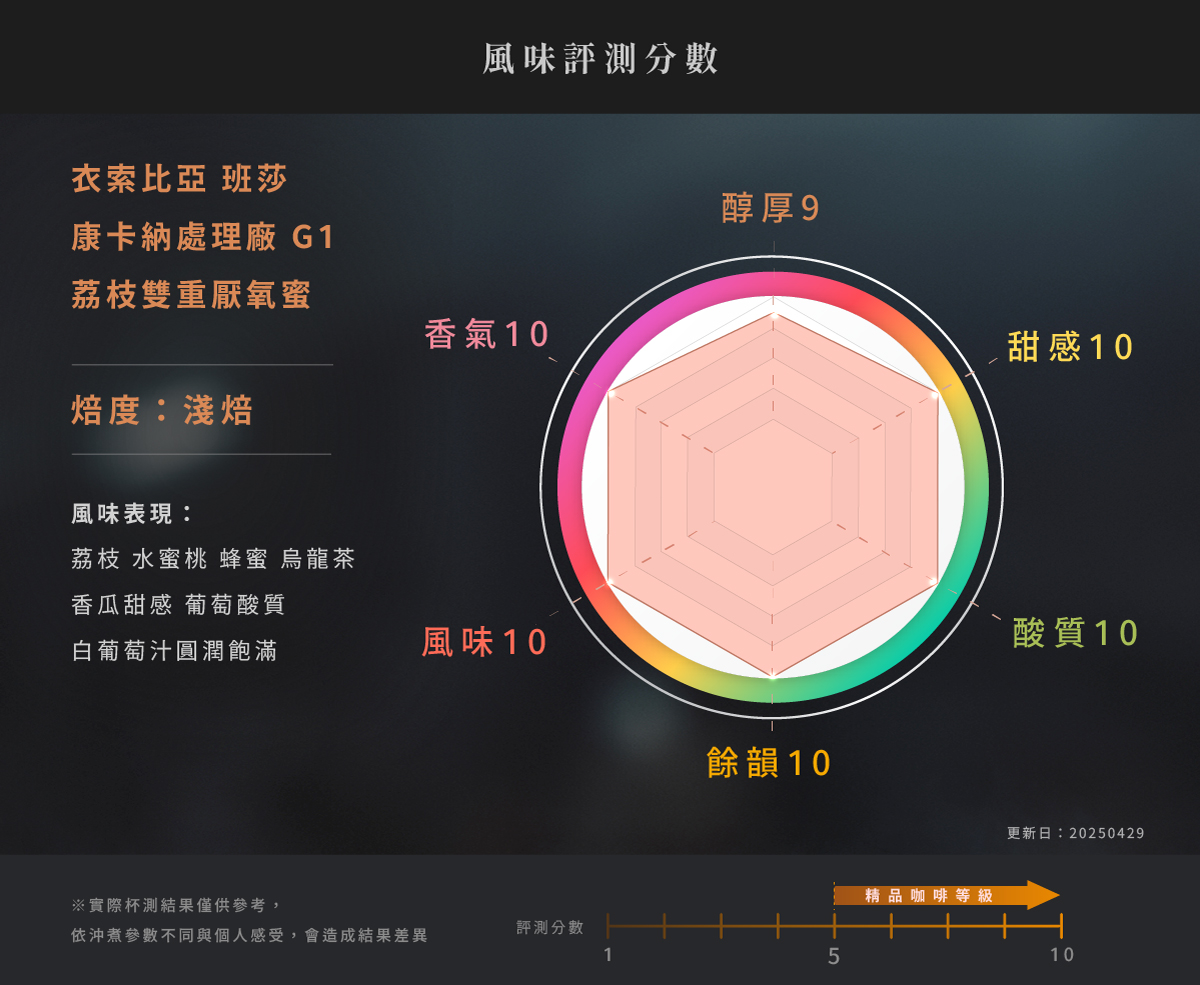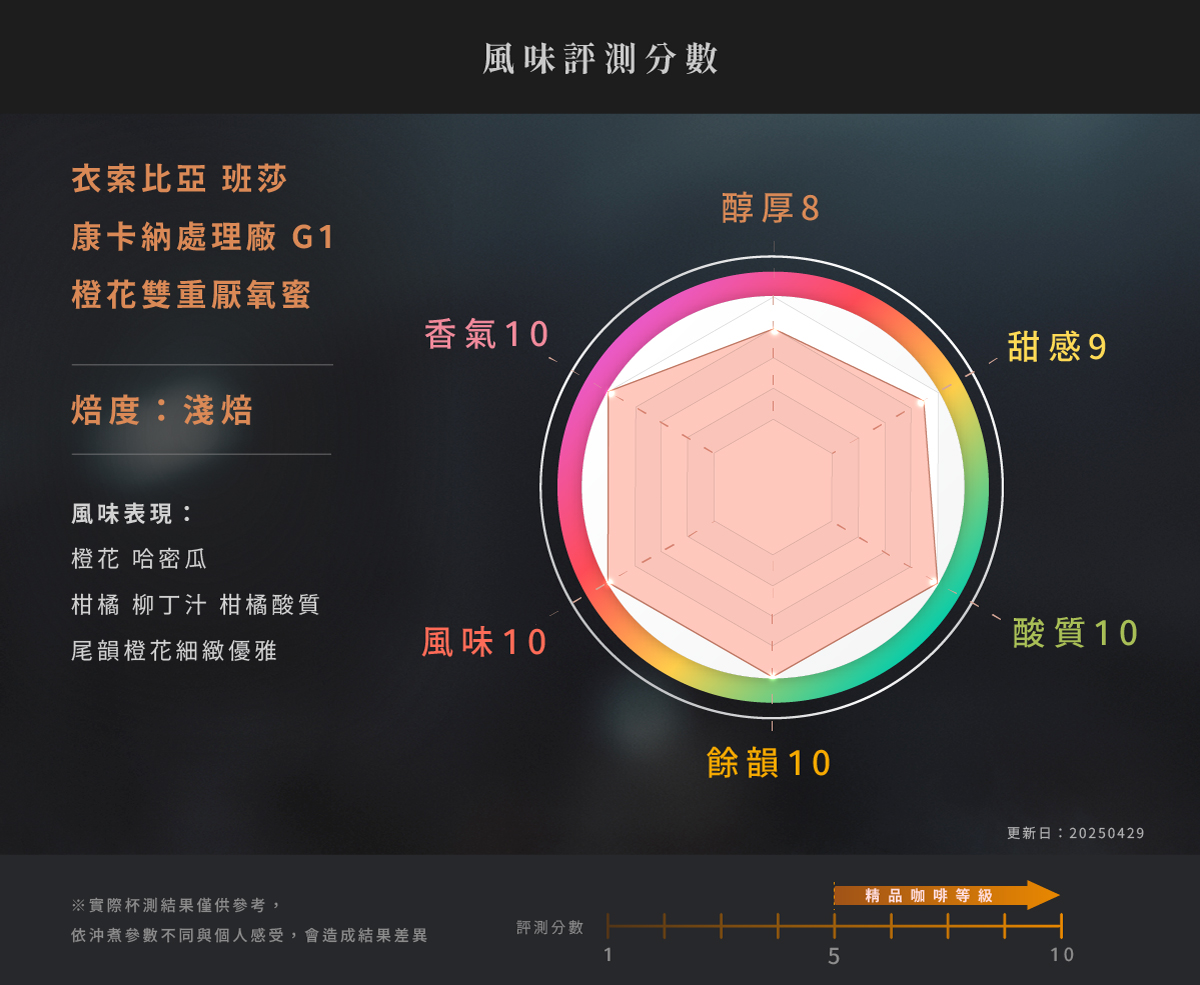

Ethiopia Sidama Bensa Qonqana G1 Double Anaerobic Honey Specialty Estate Coffee Beans Information as Follows:
Ethiopia Sidama Bensa Qonqona Rose Double G1 Anaerobic Honey

Ethiopia Sidama Bensa Qonqona Lychee Double G1 Anaerobic Honey


Ethiopia Sidama Bensa Qonqona Orange Blossom G1 Double Anaerobic Honey







 Coffee Flavor
Coffee Flavor
The flavors of coffee are derived from the breakdown of various nutrients in the green coffee beans during roasting. Heat causes these compounds to degrade into a variety of aromatic molecular structures, resulting in a wide spectrum of flavors. High-quality coffee beans naturally possess a rich aroma that evolves at different temperatures—high, medium, and low—offering a delightful and nuanced experience worth savoring.
Ethiopia Sidama Bensa Qonqona Rose Double G1 Anaerobic Honey
Rose, Honey, Pear-like Sweetness, Apple-like Acidity, Floral Finish
-----
Ethiopia Sidama Bensa Qonqona Lychee Double G1 Anaerobic Honey
Lychee, Peach, Honey, Oolong Tea, Melon sweetness, Grape acidity, Round and full-bodied white grape juice.
-----
Ethiopia Sidama Bensa Qonqona Orange Blossom G1 Double Anaerobic Honey
Orange Blossom, Melon, Citrus, Orange Juice, Bright Citrus Acidity, Elegant Orange Blossom Finish.

Qonqana Processing Station is a coffee processing facility operated by Ethiopian coffee exporter Daye Bensa. It is located in the Sidama Bensa region at an elevation of around 2,000 meters, near the banks of the Qonqana River. It is the largest and oldest processing station in the area, covering 5 hectares of land—approximately the size of five standard football fields. The station has a processing capacity of 5,000 kilograms per hour.
Unlike other processing stations, they use environmentally friendly depulping machines that significantly reduce water consumption during the depulping process. Each kilogram of coffee cherries requires only 200cc of water. This not only improves water efficiency and reduces production costs but also minimizes the environmental impact caused by wastewater.
In addition, Qonqana Processing Station under Daye Bensa maintains a close relationship with local smallholder farmers. They assist farmers in optimizing cultivation methods to improve both cup quality and yield. Similar to farmers' associations and cooperatives in Taiwan, they organize training programs at the Qonqana station, including coffee cupping and sensory evaluation, logistics, and warehouse management. They also collaborate with local schools for industry-academia partnerships, nurturing the next generation of young coffee professionals. Furthermore, they advocate to the government for coffee seedlings that are both disease-resistant and well-suited to the local climate. As coffee quality gains market recognition, farmers are able to earn better incomes.

Arabica coffee originates from Ethiopia in Africa. To this day, there are hundreds and thousands of wild coffee species within Ethiopia, many of which grow year-round in pristine forests. These indigenous wild species have undergone countless local evolutions, including hybridization, mutation, and crossbreeding, resulting in a vast gene pool of native varieties known as the Arabica gene pool. The native varieties produced within Ethiopia are referred to as Heirloom (古優原生種).
The coffee tree, botanically classified under the Rubiaceae family and the Coffea subgenus, is an evergreen tree. Coffee beans are the seeds of the coffee fruit. There are three main varieties: Arabica, Robusta, and Liberica. These three varieties cannot crossbreed to produce different subspecies. The world’s specialty coffee comes from the Arabica variety, and within Arabica, there are various subspecies resulting from evolution, hybridization, and mutation.

(Coffee Processes)
The term "processing methods" refers to the process of transforming ripe red coffee cherries into dried green beans. Each method has its advantages and disadvantages, influenced by the natural environment and the specific needs of the coffee-producing region. As a result, different regions adopt the processing method most suited to their conditions. This batch uses the following three processing methods, described below:
【Anaerobic Fermentation】
In this method, coffee cherries are placed in a sealed container filled with carbon dioxide, creating an oxygen-free environment. The low-temperature conditions slow down the breakdown of mucilage sugars and cause the pH level to decrease at a slower rate, extending the fermentation time. This process enhances sweetness and achieves a more balanced flavor profile.
The slow and prolonged fermentation helps develop a smooth, rounded taste while preventing undesirable dryness or excessive acetic acid. The sealed environment also retains aromatic compounds, preventing them from evaporating. After the anaerobic process, the coffee is further processed using the passion honey method.
【Honey / Pulped Natural / Semi-dry Process】
The honey process is a method that combines elements of both the natural process and the washed process. This technique was initially developed in Costa Rica. Similar to the washed process, the skin and pulp of the coffee cherries are removed, but the fermentation step is skipped. Instead, the mucilage layer (a sticky, sugary layer around the bean) is left intact and dried under sunlight.
The term "honey" does not refer to the addition of actual honey. Rather, it derives from the sticky texture of the mucilage, which resembles honey. The retention of this layer, rich in sugars and acids, is the key to the honey process. The amount of mucilage left on the beans determines the sweetness and flavor complexity. The flavor profile produced by the honey processing method lies between that of the natural (sun-dried) and washed processes, resulting in a very unique cup of coffee. The taste is cleaner than the natural process, and due to the residual mucilage, it also has a richer syrupy sweetness. The acidity is more pronounced than in washed coffees, but the body is richer and more full-bodied than that of washed coffees.





JUSTIN INTERNATIONAL FOOD ENTERPRISE CO., LTD.
Tel: +886-3-358-6611
1st Floor, No. 30, Lane 120, Daxing Road, Taoyuan District, Taoyuan City
▶This product is covered by a NT$10 million product liability insurance.
▶Food Industry Registration Number: F-165601955-00000-0
▶ Our company’s cupper is certified as a CQI International Coffee Quality Appraiser.



Recommended Products

※ For detailed shipping and payment information, invoices, overseas ordering instructions, etc., please click here to enter.
